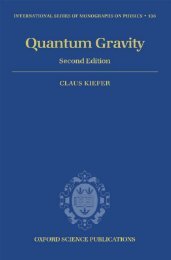Three Roads To Quantum Gravity
Three Roads To Quantum Gravity
Three Roads To Quantum Gravity
You also want an ePaper? Increase the reach of your titles
YUMPU automatically turns print PDFs into web optimized ePapers that Google loves.
WHAT CHOOSES THE LAWS OF NATURE?<br />
205<br />
is indeed something that requires explanation. If the explanation<br />
is not to be that some outside agency chose the state of the<br />
universe, there must have been some mechanism of selforganization<br />
that, acting in our past, drove the world into this<br />
incredibly improbable state. Cosmologists have been worrying<br />
about this problem for some time. One solution which has<br />
been proposed is called in¯ation. This is a mechanism by<br />
which the universe can blow itself up exponentially fast until<br />
it becomes the ¯at, almost Euclidean universe we observe<br />
today. In¯ation solves part of the problem, but it itself<br />
requires certain improbable conditions. When in¯ation begins<br />
to act, the universe must already be smooth on a scale of<br />
at least 10 5 times the Planck scale. And ± at least as far as we<br />
know ± in¯ation requires the ®ne tuning of two parameters.<br />
One of these is the cosmological constant, which must be<br />
smaller than its natural value in a quantum theory of gravity<br />
by a factor of at least 10 60 . The other is the strength of a certain<br />
force, which in many versions of in¯ation must be no greater<br />
than 10 76 . The net result is that for in¯ation to act we require<br />
a situation with a probability of at most 10 781 . Even if we<br />
leave the cosmological constant out of it, we still require a<br />
situation whose probability is at most 10 721 . So in¯ation may<br />
be part of the answer, but it cannot be the complete answer.<br />
Is it possible that some method of self-organization accounts<br />
for the fact that space looks perfectly smooth and<br />
regular, on scales hugely bigger than the Planck scale? This<br />
question has prompted some recent research, but as yet no<br />
clear answer has emerged. But if we are to avoid an appeal to<br />
religion, then this is a question that must have an answer.<br />
So, in the end, the most improbable and hence the most<br />
puzzling aspect of space is its very existence. The simple fact<br />
that we live in an apparently smooth and regular threedimensional<br />
world represents one of the greatest challenges<br />
to the developing quantum theory of gravity. If you look<br />
around at the world seeking mystery, you may re¯ect that one<br />
of the biggest mysteries is that we live in a world in which it is<br />
possible to look around, and see as far as we like. The great<br />
triumph of the quantum theory of gravity may be that it will<br />
explain to us why this is so. If it does not, then the mystic who


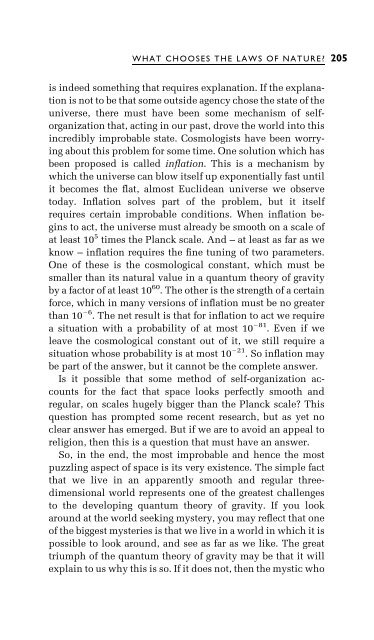
![arXiv:1001.0993v1 [hep-ph] 6 Jan 2010](https://img.yumpu.com/51282177/1/190x245/arxiv10010993v1-hep-ph-6-jan-2010.jpg?quality=85)
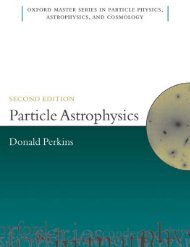
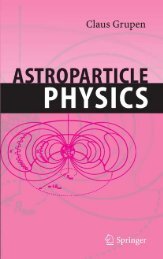
![arXiv:1008.3907v2 [astro-ph.CO] 1 Nov 2011](https://img.yumpu.com/48909562/1/190x245/arxiv10083907v2-astro-phco-1-nov-2011.jpg?quality=85)
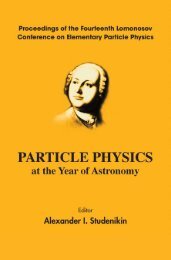
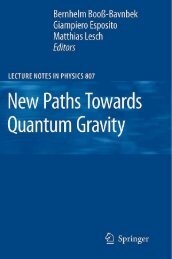
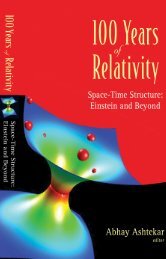

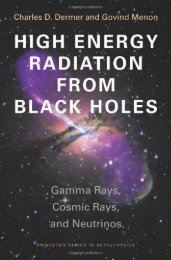
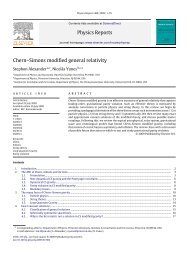
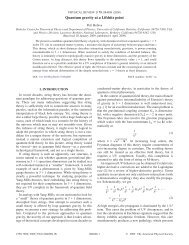
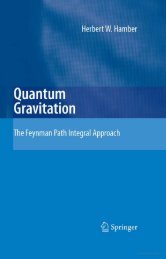
![arXiv:1002.4928v1 [gr-qc] 26 Feb 2010](https://img.yumpu.com/41209516/1/190x245/arxiv10024928v1-gr-qc-26-feb-2010.jpg?quality=85)
![arXiv:1206.2653v1 [astro-ph.CO] 12 Jun 2012](https://img.yumpu.com/39510078/1/190x245/arxiv12062653v1-astro-phco-12-jun-2012.jpg?quality=85)
